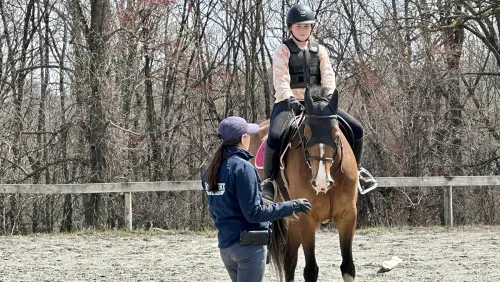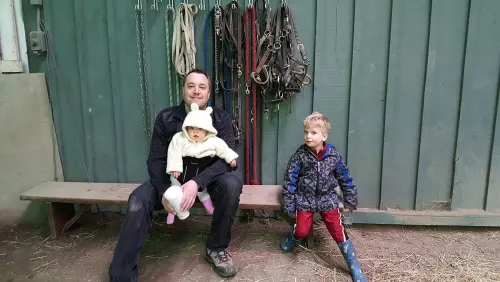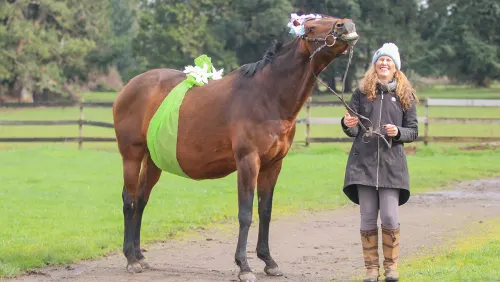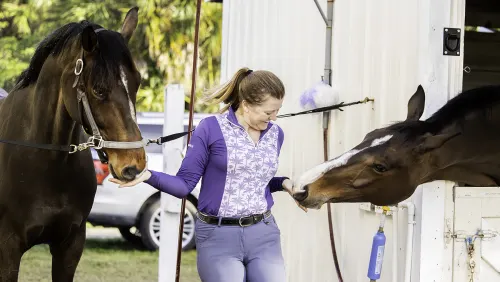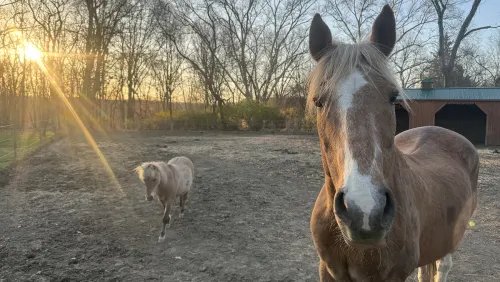My last blog, about being willing to put in the long hours and work hard to reap the benefits a great working student position can offer, received more than a few comments to the tune of this: “Sure, a great working student job is great, but so often the positions are not as advertised, or we’re treated like crap, or there’s no security blanket should something happen. It’s not worth the risk!”
That’s a very fair observation. I’ve had the incredible fortune to land fabulous working student gigs, fabulous in that I was treated respectfully, compensated for my time fairly (which only included an actual salary once), and received quality instruction regularly. Those jobs were for very reputable people, which no doubt was why the gigs were first-rate.
But even some of the best offer not-the-best working student positions, just as there are some great opportunities with people who aren’t necessarily gracing the cover of Dressage Today or Practical Horseman. How do you separate the wheat from the chaff? Here are a few of my thoughts.
1. Talk to them. I always start my process with a phone interview (though lately I’ve been using Skype or Facetime—love it!), where naturally I do a lot of the asking questions, but I always make sure that I answer any questions my potential working students ask. And don’t forget to ask the good questions. Yes, ask about how often working students receive lessons, or how many horses a day you might be expected to ride, but ask about the housing. Is it on the property? Is there a full kitchen? Air conditioning? What about things like workers compensation, or holidays off? Whether these things are deal breakers or not is up to you, but it’s very important to know what you’re in for.
Also ask how long working students tend to stick around for. Don’t let this number scare you—I find that, while six months to a year seems to be the average, there are plenty of outliers for plenty of reasons, good and bad. (Fun fact: I was very distraught after an absolutely useless girl only lasted six days before quitting. She was horrid, and I was thrilled to see the back of her, but I still was doubting myself. Lendon Gray reassured me: “The record for me is 24 hours!”)
2. Talk to others. Google is thy friend, though know that even the absolute best of trainers and employers inevitably has a disgruntled student or former employee out there who may or may not be making noise. See if your potential boss will put you in touch with a current or, even better, former working student.
And ask them how the working student gig helped them. Of the 15-or-so employees I’ve had here over seven years, many have left the horse industry, and that’s OK. This isn’t for everyone. But I’m willing to bet that most of them would tell you they still got a lot out of their time here. They learned the value of hard work, how to work well with others, how to talk to customers (especially about issues as emotional as horses can be sometimes) and how to hunker down and get ‘er done when you’re in the middle of a 16-consecutive-weekends-of-horse-shows-and-clinics and it’s 95 degrees every day and at 2 a.m. the well pump dies. But ask the ones who’ve stayed in the business if they felt they got good contacts through the person for whom you’d be working. I have students who are now trainers out on their own, and I’d like to think my job helped them get there.
3. Take a trial period. I’ve started offering a paid trial period for serious candidates, which can sometimes be a pain in the butt if you’re coming in from somewhere across the country; it’s a nuisance to have to fly or drive back and forth more than once. But peace of mind is huge, and you can get a real sense of a place in a week or two. It also lets you meet the people you’ll be working with, which is a HUGE part of what makes a job fun—if the job is great but it’s no fun to be at work, that’s wretched.
ADVERTISEMENT
4. Have an escape plan. Even when I was working for awesome people who seemed to like me, and things were going great, I always knew how I could get out with 24 hours’ warning, should things go south.
And I don’t just mean things like what-if-my-boss-goes-off-the-deep-end. What if a big client leaves, taking multiple horses with her, and suddenly your boss needs to downsize employees? What if she gets hurt or sick? What if YOU get hurt or sick? We all hope that things like that don’t happen, and that if, heaven forbid, they do, you wouldn’t get kicked to the curb with no warning. But like a good Boy Scout, be prepared. Make sure your car always has tires on it and has an engine that starts. If you own a horse and your job allows him to come with you, know how you’d get him out.
5. Give it time. If you’re coming to a working student job from something else—a desk job, or being a full-time student—the first few weeks are hell.
You’re going to be sore. You’re going to be tired. You’re going to be a little bewildered, walking into a situation where you don’t know where they keep the stable bandages or the hoof polish or the extra brooms, or which horse gives you the stink eye when you go to feed him or mess with his blankets, or which one doesn’t like to get caught in the field. You’re going to learn someone else’s words, someone else’s riding system (which, hopefully, is one based in common sense and proper technique, but everyone comes at it from their own way and their own place). And you’ll be working and living with people who have all been together a while, and you’re the New One. It may not be sunshine and butterflies from minute one.
Hang in there. You’ll get stronger. You’ll make friends. You’ll learn which horses like what, and how to dump the manure spreader, and the best grocery store in town, and what to do for fun on your night off.
You’ll learn what your trainer means when she says things like “keep your hand at the mouth,” or that she prefers coolers to quarter sheets. But it won’t happen overnight. Stick it out. Ask questions like crazy. Ask how your boss likes stuff done; don’t just assume your way is the right way, even if it is. Learn to like a cup of coffee in the morning. Stay in motion, make yourself invaluable. The opportunies will come.







